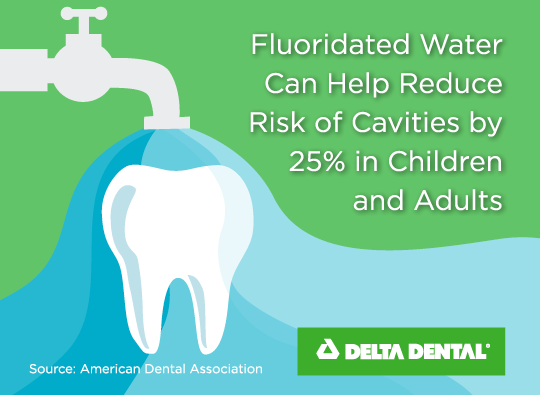We all know that regular brushing and visits to the dentists are key to a healthy mouth, but have you thought about the water that you’re drinking?
For more than 75 years, communities across the U.S. have been adding fluoride into drinking water, and the dental benefits have been clear. Studies have shown that fluoridated water systems have led to a reduction of cavities by about 25%, and in doing so, have lowered dental costs for individuals and families.
Given that cavities continue to be one of the most common oral health issues among people of all ages, providing access to fluoridated water seems like a no-brainer. In fact, the CDC has named water fluoridation as one of the 10 Great Public Health Achievements of the 20th Century.
However, while an average of 73% of Americans live in communities with fluoridated water, the same is true for only about 56% of Washingtonians on public water systems. What's more, this lack of access disproportionately affects rural, low-income, and underserved communities who are already at greater risk for dental disparities.
It’s important that we understand why fluoride is in water to begin with and the benefits of fluoridated water. By better understanding these key facts, we can continue working toward giving everyone a fair chance to enjoy the oral health that they deserve.
For more information on Arcora Foundation’s work on community water fluoridation in Washington, visit their website.
Learn More
What's the Meaning of Fluoridated Water and How Does It Work?
Almost all water has some amount of naturally occurring fluoride, but it’s often too little to have any impact on oral health. Water fluoridation is the process of balancing the levels to be optimal for strengthening teeth and fighting cavity-causing acids (a recommended concentration of 0.7 milligrams per one liter of water).
As we brush our teeth and drink fluoride-fortified tap water throughout the day, we're provided with a continuous, low-level stream of fluoride to the mouth. This fluoride bonds with weakened enamel to prevent decay and even rebuild the surface of the teeth.
Why Is Fluoride in Drinking Water?
1. The fluoridation of drinking water has oral and overall benefits for people of all ages.
Fluoridated water has been shown to prevent tooth decay by at least 25% across all ages — and that’s in addition to the prevention provided by fluoride in toothpaste, mouthwash, and fluoride varnish.

This is especially important for populations who are at greater risk for developing decay, such as children and the elderly. On average, schoolkids in communities with fluoride in the drinking water have two fewer decayed teeth than children who lack access. Similarly, adults born after water fluoridation became common in the U.S. have shown a much lower need for dentures and dental implants later in life.
As we know, the status of our dental health can affect so many aspects of our lives. Tooth decay, cavities, and other oral issues can cause pain, difficulty concentrating, and embarrassing changes to the appearance of the mouth. When left untreated, these problems can progress to the loss of teeth, the need for costly procedures, and even certain cancers. By making sure we get the right amount of fluoride we need, we can greatly reduce these risks and enjoy better oral and overall health throughout our lives.
2. Fluoride is safe and natural.
Several discussions have made the rounds concerning the belief the fluoride is bad or somehow dangerous. But unless it's consumed at significantly higher levels than recommended, this couldn't be further from the truth. Fluoride is nature's cavity fighter, found in virtually all water supplies, including fresh and saltwater sources. Fluoride is a component of fluorine, one of the top 20 most abundant natural elements within the Earth's crust.
But while fluoride naturally occurs in water, some sources only contain trace amounts of the mineral — not enough to protect our teeth. Through community water fluoridation, the amount of fluoride in tap water is balanced to the recommended levels for preventing decay.
Over the 75+ years that the process has existed, the latest and best scientific research has continuously shown it to be safe and effective. Water fluoridation is supported by every major health organization in the U.S., including the CDC and the American Dental Association.
3. Water fluoridation is cost-effective and saves money.
Water fluoridation has been deemed one of the most cost-effective ways to reduce tooth decay and dental expenses across all communities. In fact, it’s so inexpensive the American Dental Association reports that the average lifetime cost per person to fluoridate drinking water is less than the cost of a single filling. For every $1 spent by communities on water fluoridation, the average person saves $38 in dental costs. That’s a difference of 3,700%!
Ideally, all communities should have the recommended levels of fluoride in the drinking water, but there are no laws or regulations requiring this. If you don’t know the status of your water, the easiest way to find out is by checking with your community’s water provider. Washington residents can view fluoridated water maps on the state's Department of Health website, or access a document to learn if their water system is fluoridated.
If there's inadequate fluoride in your drinking water, speak to your dentist. They can talk with you about potential options, such as prescription fluoride toothpaste or oral supplements. And as always, be sure to stay up on proper at-home care and regular dental checkups to help maintain a healthy smile for life.
How Do I Know If My Water is Fluoridated?
Ideally, all communities should have the recommended levels of fluoride in the drinking water, but there are no laws or regulations requiring this. If you don’t know the status of your water, the easiest way to find out is by checking with your community’s water provider. Washington residents can view fluoridated water maps on the state's Department of Health website, or access a document to learn if their water system is fluoridated.
If there's inadequate fluoride in your drinking water, speak to your dentist. They can talk with you about potential options, such as prescription fluoride toothpaste or oral supplements. And as always, be sure to stay up on proper at-home care and regular dental checkups to help maintain a healthy smile for life.
For more information on Arcora Foundation’s work on community water fluoridation in Washington, visit their website.
Learn More












